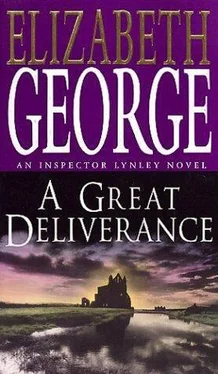Elizabeth George - A Great Deliverance
Здесь есть возможность читать онлайн «Elizabeth George - A Great Deliverance» весь текст электронной книги совершенно бесплатно (целиком полную версию без сокращений). В некоторых случаях можно слушать аудио, скачать через торрент в формате fb2 и присутствует краткое содержание. Жанр: Триллер, на английском языке. Описание произведения, (предисловие) а так же отзывы посетителей доступны на портале библиотеки ЛибКат.
- Название:A Great Deliverance
- Автор:
- Жанр:
- Год:неизвестен
- ISBN:нет данных
- Рейтинг книги:4 / 5. Голосов: 2
-
Избранное:Добавить в избранное
- Отзывы:
-
Ваша оценка:
- 80
- 1
- 2
- 3
- 4
- 5
A Great Deliverance: краткое содержание, описание и аннотация
Предлагаем к чтению аннотацию, описание, краткое содержание или предисловие (зависит от того, что написал сам автор книги «A Great Deliverance»). Если вы не нашли необходимую информацию о книге — напишите в комментариях, мы постараемся отыскать её.
A Great Deliverance — читать онлайн бесплатно полную книгу (весь текст) целиком
Ниже представлен текст книги, разбитый по страницам. Система сохранения места последней прочитанной страницы, позволяет с удобством читать онлайн бесплатно книгу «A Great Deliverance», без необходимости каждый раз заново искать на чём Вы остановились. Поставьте закладку, и сможете в любой момент перейти на страницу, на которой закончили чтение.
Интервал:
Закладка:
Barbara looked down at the paper in her hand, at the handwriting which even in a hurry still managed to be an elegant scrawl. She studied it for more than a minute before she ripped it into tiny pieces and tossed them into the rubbish. She knew quite well where Thomas Lynley lived.
The guilt began on the Uxbridge Road. It always did. Tonight it was worse when she saw that the travel agency was closed, preventing her from gathering the material on Greece as she’d promised. Empress Tours. Where had they ever come up with a name like that for such a grubby little shop where people sat behind plastic-topped desks that were painted to look as if they were wood? She slowed the car, peering through the dirty windscreen to look for signs of life. The owners lived above the shop. Perhaps if she banged on the door a bit, she could rouse them. No, it was too ridiculous. Mum was no more going to Greece than to the moon; she’d just have to wait for the brochures a bit longer.
Still, she’d passed at least a dozen agencies in the city today. Why hadn’t she stopped? What else did Mum have to live for but those silly little dreams? Overcome with the need to compensate in some way for her failure, Barbara pulled the car over in front of Patel’s Grocery, a ramshackle affair of green paint, rusting shelves, and precariously stacked crates from which emanated that peculiar blend of odours that comes from vegetables not quite as fresh as they ought to be. Patel was still open, at least. Leave it to him never to miss a chance to make ten pence.
“Barbara!” He greeted her from inside the shop as she bent over the boxed fall fruit on the pavement outside. Mostly apples. A few late peaches shipped in from Spain. “Whassa doin’ out so late?”
He couldn’t imagine her having a date, of course. No one could. She couldn’t herself. “Had to work late, Mr. Patel,” she replied. “How much for the peaches?”
“Eighty-five a pound, but for you, pretty face, we say eighty.”
She picked out six. He weighed them, wrapped them, and handed them over. “I was seeing your father today.”
She looked up quickly and caught the guard dropping over Mr. Patel’s dark face like a mask when he saw her expression. “Was he behaving himself?” she asked casually, shouldering her handbag.
“My goodness, yes. He always behaves!” Mr. Patel took her money, counted it twice carefully, and dropped it into his register. “You take care now, Barbara. Men see a nice girl like you and-”
“Yes, I’ll take care,” Barbara interrupted. She tossed the peaches onto the front seat of the car. Nice girl like you, Barb. You take care. Keep those legs crossed. Virtue like yours is defi nitely easy to lose, and a woman fallen is fallen forever . She laughed bitterly, jerked the car into gear, and pulled out onto the road.
In Acton there were two potential areas of residence, simply called by inhabitants the right and wrong streets. It was as if a dividing line split the suburb arbitrarily, condemning one set of residents while it elevated others.
On the right streets of Acton, pristine brick houses boasted woodwork which always sparkled admirably in the morning sun in a multiplicity of colours. Roses grew in abundance there. Fuchsias flourished in hanging pots. Children played games on unlittered pavements and in patchwork gardens. Snow kissed gabled roofs in peaks of meringue in the winter, while in summer tall elms made green tunnels through which families strolled in the perfumed evening light. There was never an argument in the right streets of Acton, never loud music, the smell of cooking fish, or fi sts raised in a fight. It was sheer perfection, the single ocean on which every family’s boat of dreams sailed placidly forward. But things were much different as close as a single street away.
People liked to say that the wrong streets of Acton got the heat of the day and that’s why things were so different there. It was as if an enormous hand had swept down from the sky and jumbled up houses and avenues and people so that everything was always just a bit out of sorts. No one worked quite so hard on appearances: houses sagged moodily into decay. Gardens once planted were soon ignored, then forgotten altogether and left to fend for themselves. Children played noisily on the dirty pavements, disruptive games that frequently brought mothers to doorways, shrieking for peace from the din. The winter wind spit through poorly sealed windows and summer brought rain that leaked through the roofs. People in the wrong streets didn’t think much about being anywhere else, for to think of being elsewhere was to think of hope. And hope was dead in the wrong part of Acton.
Barbara drove there now, turning the Mini in on a street lined with cars that were rusting like her own. Neither garden nor fence fronted her own house, but rather a pavement-hard patch of dirt on which she parked her little car.
Next door, Mrs. Gustafson was playing BBC-1. Since she was nearly deaf, the entire neighbourhood was nightly regaled with the doings of her favourite television heroes. Across the street, the Kirbys were engaging in their usual preintercourse argument while their four children ignored them as best they could by throwing dirt clods at an indifferent cat that watched from a nearby fi rst-fl oor window sill.
Barbara sighed, groped for her front door key, and went into her house. It was chicken and peas. She could smell it at once, like a gust of foul breath.
“That you, lovey?” her mother’s voice called. “Bit late, aren’t you, dear? Out with some friends?”
What a laugh! “Working, Mum. I’m back on CID.”
Her mother shuffled to the door of the sitting room. Like Barbara, she was short, but terribly thin, as if a long illness had ravaged her body and taken it sinew by sinew on a march towards the grave. “CID?” she asked, her voice growing querulous. “Oh must you, Barbara? You know how I feel about that, my lovey.” As she spoke she raised a skeletal hand to her thin hair in a characteristic, nervous gesture. Her overlarge eyes were puffy and rimmed with red, as if she had spent the day weeping.
“Brought you some peaches,” Barbara responded, gesturing with the sack. “The travel agent was closed, I’m afraid. I even banged on the door to get them down from above, but they must’ve gone out.”
Diverted from the thought of CID, Mrs. Havers’s face changed, lighting with a dusty glow. She caught at the fabric of her shabby housedress and held it bunched in one hand, as if containing excitement. “Oh, that doesn’t matter at all. Wait till you see. Go in the kitchen and I’ll be right there. Your dinner’s still warm.”
Barbara walked past the sitting room, wincing at the chatter of the television and the fusty smell of a chamber too long kept closed. The kitchen, fetid with the odour of tough, broiled chicken and anaemic peas, was little better. She looked gloomily at the plate on the table, touched her fi nger to the withered fl esh of the fowl. It was stone cold, as slippery and puckered as something kept preserved in formaldehyde for forensic examination. Fat had congealed round its edges, and a single, rancid dab of butter had failed to melt on peas that looked as if they had had their last warming in a former decade.
Wonderful, she thought. Could the “lovely crab salad” have even come close to this epicurean splendour? She looked for the daily paper and found it, as always, on the seat of one of the wobbly kitchen chairs. She grabbed the front section, opened it to the middle, and deposited her dinner on the smiling face of the Duchess of Kent.
“Lovey, you’ve not thrown away your nice dinner!”
Damn! Barbara turned to see her mother’s stricken face, lips working in rejection, lines drawn in deep grooves down to her chin, pale blue eyes filled with tears. She clutched an artificial leather album to her bony chest.
Читать дальшеИнтервал:
Закладка:
Похожие книги на «A Great Deliverance»
Представляем Вашему вниманию похожие книги на «A Great Deliverance» списком для выбора. Мы отобрали схожую по названию и смыслу литературу в надежде предоставить читателям больше вариантов отыскать новые, интересные, ещё непрочитанные произведения.
Обсуждение, отзывы о книге «A Great Deliverance» и просто собственные мнения читателей. Оставьте ваши комментарии, напишите, что Вы думаете о произведении, его смысле или главных героях. Укажите что конкретно понравилось, а что нет, и почему Вы так считаете.












